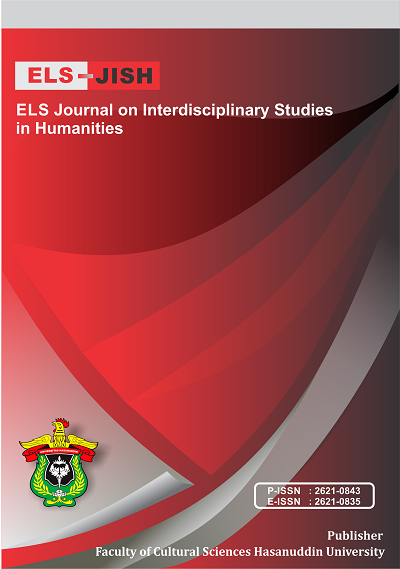Gender-based Analysis of Interactional Markers in Personal Essays
DOI:
https://doi.org/10.34050/elsjish.v6i3.27855Keywords:
Corpus based analysis, Gender, Interactional device, Personal essayAbstract
This study examined the interactional metadiscourse devices and the correlation with gender in personal essays. The data was taken from 20 essays, 10 essays from each respective genders which are published by Chicken Soup for the Soul in several editions. Tokens of interactional metadiscourse devices were obtained by using corpus software Antconc 3.5.9. The occurrence then underwent qualitative examination to sort only items used as interactional devices based on interactional metadiscourse taxonomy proposed by Hyland. This feature have been widely used to identify the interaction and meaning-making in many persuasive and academic writings as well as talks such as TED talks. To fill the gap, this study aimed to see the differences of interactional metadiscourse devices usage by women and men in personal essays. The result shows that women use more interactional discourse markers than men except for hedges category. In general, women use more interactional discourse in personal essays to express themselves and to let their readers feel being engaged in the story through emotive connections. Whereas, men write their stories more directly and attract the reader on the sequence of events.
References
Abdul Aziz, R., Chiu Jin, C., & Nordin, N. M. (2016). The Use of Interactional Metadiscourse in the Construction of Gender Identities among Malaysian ESL Learners. 3L The Southeast Asian Journal of English Language Studies, 22(1), 207–220. https://doi.org/10.17576/3L-2016-2201-16
Alghazo, S., Al Salem, M. N., & Alrashdan, I. (2021). Stance and engagement in English and Arabic research article abstracts. System, 103, 102681. https://doi.org/10.1016/j.system.2021.102681
Alhabuobi, T. (2021). Variation in Language Use across Gender. Theory and Practice in Language Studies, 11(2), 129. https://doi.org/10.17507/tpls.1102.03
AlJazrawi, D. A., & AlJazrawi, Z. A. (2019). The Use of Meta-discourse An Analysis of Interactive and Interactional Markers in English Short Stories as a Type of Literary Genre. International Journal of Applied Linguistics and English Literature, 8(3), 66. https://doi.org/10.7575/aiac.ijalel.v.8n.3p.66
Alqahtani, S. N., & Abdelhalim, S. M. (2020). Gender-based Study of Interactive Metadiscourse Markers in EFL Academic Writing. Theory and Practice in Language Studies, 10(10), 1315. https://doi.org/10.17507/tpls.1010.20
Angouri, J., & Baxter, J. (2021). The Routledge Handbook of Language, Gender, and Sexuality (J. Angouri & J. Baxter, Eds.; 1st ed.). Routledge. https://doi.org/10.4324/9781315514857
Azlia, S. C. (2022). Interactional discourse of male and female motivational speech in TED Talks: A corpus-based study. Rainbow : Journal of Literature, Linguistics and Culture Studies, 11(1), 42–49. https://doi.org/10.15294/rainbow.v11i1.54777
“Chicken Soup for Soul” Series: 30 Years of Inspiring Stories: [1]. (2008). In Voice of America News / FIND (190564568). Federal Information & News Dispatch, LLC; Research Library. https://www.proquest.com/reports/chicken-soup-soul-series-30-years-inspiring/docview/190564568/se-2?accountid=13771
Eckert, P., & McConnell-Ginet, S. (2003). Language and Gender. Cambridge University Press.
Fivush, R., & Grysman, A. (2022). Narrative and gender as mutually constituted meaning-making systems. Memory, Mind & Media, 1, e2. https://doi.org/10.1017/mem.2021.4
Harris, W. L. (2017). Writing & Selling Short Stories & Personal Essays. Writer’s Digest Books.
Holmes, J. (1989). Sex Differences and Apologies: One Aspect of Communicative Competence1. Applied Linguistics, 10(2), 194–213. https://doi.org/10.1093/applin/10.2.194
Holmes, J. (1990). Hedges and boosters in women’s and men’s speech. Language & Communication, 10(3), 185–205. https://doi.org/10.1016/0271-5309(90)90002-S
Holmes, J. (1995). Women, Men and Politeness. Longman.
Hyland, K. (2005). Metadiscourse: Exploring interaction in writing. Continuum.
Hyland, K., & Tse, P. (2004). Metadiscourse in Academic Writing: A Reappraisal. Applied Linguistics, 25(2), 156–177. https://doi.org/10.1093/applin/25.2.156
Johnstone, B. (1990). Stories, Community, and Place: Narratives from Middle America. Indiana University Press.
Johnstone, B. (1993). Community and contest: Midwestern men and women creating their worlds in conversational storytelling. In Gender and Conversational Interaction (pp. 62–80). Oxford University Press.
Lakoff, R. (1975). Language and woman’s place. Language in Society, 2(1), 45–79. Cambridge Core. https://doi.org/10.1017/S0047404500000051
Park, G., Yaden, D. B., Schwartz, H. A., Kern, M. L., Eichstaedt, J. C., Kosinski, M., Stillwell, D., Ungar, L. H., & Seligman, M. E. P. (2016). Women are Warmer but No Less Assertive than Men: Gender and Language on Facebook. PLOS ONE, 11(5), e0155885. https://doi.org/10.1371/journal.pone.0155885
Pasaribu, T. A. (2017). Gender Differences and the Use of Metadiscourse Markers in Writing Essays. International Journal of Humanity Studies (IJHS), 1(1), 93–102. https://doi.org/10.24071/ijhs.v1i1.683
Qiu, X., & (Kevin) Jiang, F. (2021). Stance and engagement in 3MT presentations: How students communicate disciplinary knowledge to a wide audience. Journal of English for Academic Purposes, 51, 100976. https://doi.org/10.1016/j.jeap.2021.100976
Scotto di Carlo, G. (2014). The role of proximity in online popularizations: The case of TED talks. Discourse Studies, 16(5), 591–606. https://doi.org/10.1177/1461445614538565
Stone, J. A., & Can, S. H. (2021). Gendered language differences in public communication? The case of municipal tweets. International Journal of Information Management Data Insights, 1(2), 100034. https://doi.org/10.1016/j.jjimei.2021.100034
Tausczik, Y. R., & Pennebaker, J. W. (2010). The Psychological Meaning of Words: LIWC and Computerized Text Analysis Methods. Journal of Language and Social Psychology, 29(1), 24–54. https://doi.org/10.1177/0261927X09351676
Urquhart-Cronish, M., & Otto, S. P. (2019). Gender and language use in scientific grant writing. FACETS, 4(1), 442–458. https://doi.org/10.1139/facets-2018-0039
Downloads
Published
How to Cite
Issue
Section
License
Copyright (c) 2023 Sasmita Ratna Puspita, Suhandano

This work is licensed under a Creative Commons Attribution-ShareAlike 4.0 International License.






